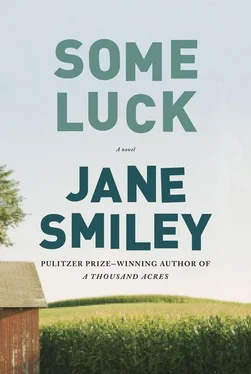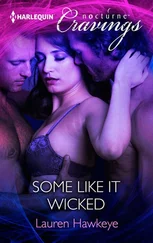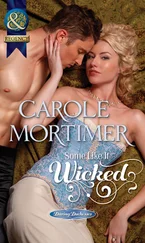“Usherton, Iowa.”
“What time is it?”
“Almost ten.”
“And who are you?”
Lillian couldn’t help smiling. She said, “Who’s asking?”
“Arthur.”
“Lillian.”
“ Lill ian. How lovely. I expected irises and poppies and a few dandelions, but no Lill ians.”
“May I get you anything, sir?” She saw Charlie looking at her.
“A cup of coffee and a Coca-Cola.”
“Both?”
“You’ll see.” And she did — he poured some of the Coke into the cup of coffee, and drank that down, then finished the Coke. After the drugstore closed, he asked her to show him the block. The block was nothing special, but he put her hand through his arm, then made up a story about every building as they strolled through the darkness: Was that where the hole in the basement was, the one where the gold bars had been found, that Pretty Boy Floyd had left there? Hadn’t she heard about that? In Rapid City, it was all they talked about. Or that place there, didn’t she see the faces in the window? Mrs. Lester Tester had twenty-seven children, twenty-six of them girls. “We just wanted a boy,” said Mrs. Tester, “so we kept on trying.” Lillian laughed and laughed. “What are you laughing at?” exclaimed Arthur. “These are serious matters.”
He walked her to her car (Papa’s car, which she used when she worked late) and insisted she lock the doors before she drove off. When she came on her shift at noon the next day, he sat down at the counter and ordered a hot dog.
It took two days for Lillian to learn Arthur’s surname, and by the time she did learn it, he had already proposed and she had already accepted. His surname was Manning. Arthur Manning. Arthur Brinks Manning. Mrs. Arthur Brinks Manning. Lillian Manning. Lillian Langdon Manning. Lillian Elizabeth Langdon Manning. She wrote them all down on a piece of paper, and then folded the paper into a tiny wad and put it in the pocket of her favorite sweater.
Arthur Manning was driving from Rapid City, South Dakota, to Bethesda, Maryland. He had to be there on October 15. It was now October 13. Lillian sat on her bed in her still-pink bedroom, and looked at the pictures she had never changed, the alphabet, a faded photograph of Mary Elizabeth in a white frame, a picture of some lilies. The pink-and-white-striped curtains. The rag rug her granny had made. The profiles of the farmer, his wife, their cow, their horse, pig, lamb, rabbit, squirrel, fox, and bird. What to take with her? Why was it so alluring that Arthur had not gotten down on his knees, or offered her a ring, just put his chin on her head and said, “You’ve got me, Lily darling, Lili Damita, Lily Pons, Lily Langdon. I said I would never marry again, but I must, if you will.”
“Were you married, Arthur?”
Then he sat her down on a bench, looking at the park, and he said, “Lily Langdon, I was married for two years, and my wife got pregnant, and when she was eight months along, she had a stabbing pain in her back. I was away on a trip, and she was from Alabama and didn’t have any friends in Bethesda, so she didn’t call anyone. By the time I got back, the bleeding had gone on for two days, and I only got her to the hospital in time for her to die. The baby was already dead.”
“What caused that?” said Lillian. Lillian knew she was saying this to give herself time for the sadness of what he was telling her to register. He kept looking at her. She swallowed.
He said, “They told me the placenta broke away from the uterine wall.” He put his hands on either side of her face. He said, “Marriage can be a terrible thing, which is why I propose to you in despair.”
Lillian slipped her arm under Arthur’s and laid her head against his chest. They both took that as a yes.
As she sat on her bed, looking around, Lillian thought that he had suitably terrified them both, and therefore he was just the right person for her. She actually didn’t think that Rosanna would dislike him or that Walter would make a fuss. But she wanted him all to herself. So she found a paper sack and put a few things in it — two brassieres and some panties, an extra slip, and her white batiste blouse she had just bought. The twill gored skirt Rosanna had made her. Nothing she was taking was pink, which amused her. Then she opened the drawer of her chest and took out her savings and the golden feather — they were wrapped together in tissue paper. She tucked the packet inside the folded-up skirt. She set a few bits of makeup on top of the skirt — her compact was in her purse, but she chose two lipsticks, a foundation she had just opened, the mascara. Her boar-bristle hairbrush. She folded up the bag and slid it under the bed. Joey would unknowingly drop her at the drugstore at ten, and they would leave from there. She had already written her note to Mama and Papa. She would slip that under her pillow, and leave the bed unmade. Mama would flounce into the room, annoyed that Lillian had not made her bed, and find it. Then — who knew? It gave Lillian a bona-fide thrill to think of it.

LILLIAN WOULD NOT have said that she knew a great deal about Arthur, but she only thought about this when he wasn’t around. During the day, she tried to spend her time appreciating her apartment in an imposing brick building with white trim that rather reminded her of her high school and the short walks she could take in the neighborhood. She had a small but warm bathroom, reliable hot water, and a deep and satisfying bathtub. She had a gas range, and every time she checked the pilot light, it was still lit. There was a park that ran up to the boundary of the insane asylum, but Lillian preferred the little looping streets and sometimes took the streetcar to different sections — Georgetown and Woodley Park were her favorites — and walked around there. She liked to shop at the Giant supermarket, and she especially enjoyed something called “Cheerios.” After nearly twenty years of oatmeal, these Cheerios were a constant pleasure.
In the fall, she had gone to all sorts of sights around the District, first with Arthur, then on her own — the Smithsonian, the Capitol Building, the Memorials — all of them in the howling wind. In fact, the best time they’d had was just before Christmas, when an ice storm coated all the cherry trees along Potomac Drive and then the sun came out and set the ice alight. It hadn’t even been cold that day — they’d marched along with their coats open, laughing and glorying in the sparkling blackness of the branches. But now she was nearly four months pregnant, and though she didn’t look it, she felt it, so she stayed around the apartment, secretly feeling that the many flights of stairs to their front door, twice a day, was plenty of exercise. What in the world they would do when the baby came and there was a baby carriage, Lillian had no idea, but she had faith that Arthur would take care of it.
She did know that Arthur was the same age as Frank, that he had spent the war in Washington, working for the OSS, breaking codes; that he spoke German and also French; that his mother’s family was from New Orleans; that he had gone to Williams College, which was in Massachusetts. Colonel Manning, his father, visited sometimes. He lived in Charlottesville, Virginia. When he came and when he left, he leaned over slightly in order for Lillian to plant a kiss on his cheek, and he always took her right hand in his and patted it three times with his left. Like Arthur, he had a twinkle in his eye, but he didn’t tell stories the way Arthur did. Arthur’s mother had been a great beauty and had died. Of all the things they never talked about, she was the prime mystery. All Lillian knew of her was her photograph on the mantel. She looked like Greta Garbo with blond hair. Sometimes, Lillian thought that the picture was too much — she, Lillian, would never be that beautiful, and with the baby and all, she was getting less beautiful every day. Her hair, for example, was falling out — she didn’t even have to brush it, it just dropped all around her. The first wife, Alice, had been a beauty, too. Her photograph sat beside the mother’s, because, Arthur said, there was no one else to remember her but himself. Did Lillian mind?
Читать дальше













